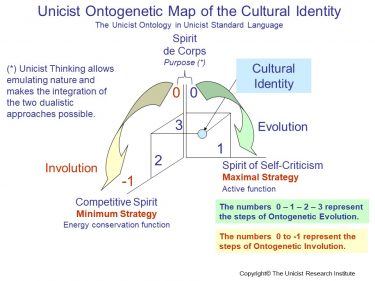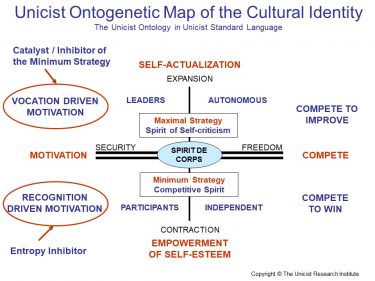The identity of a culture is defined by the spirit de corps that defines their identity based on the greater good that needs to be achieved, the spirit of self-criticism which defines the natural trend to improve things and amend damages and the competitive spirit which empowers the self-esteem of a culture.
The empowerment of the cultural identity of a society is the driver of transgenerational evolution. This identity needs to be empowered in the elites of a culture and transcend to all the members of a society.
It inhibits paternalism, which is part of the collective intelligence, because it is centered on the actions of people. As it was mentioned, the cultural identity is integrated by the spirit de corps, the spirit of self-criticism and the competitive spirit.
The cultural identity is the catalyst of collective intelligence that drives the evolution of groups, organizations or societies.
It is based on the spirit de corps that establishes the identity of the group, it is driven by the spirit of self-criticism which in fact establishes the standard for social justice and is sustained by the competitive spirit that sustains the sense of belonging by empowering self-esteem within the boundaries of a greater good that needs to be achieved.
The Ontogenetic Structure of the Cultural Identity
The cultural identity is an attribute of a culture and defines its trend toward evolution. The existence of a cultural identity of a group, organization or society depends on the existence or a greater good in the collective intelligence.
The Spirit de Corps
This greater good defines the sense of belonging of the members of the environment which establishes the limits of being an insider or an outsider.
The spirit de corps is sustained by the pride people feel to do what they need to do that allows ensuring the greater good that drives the culture.
The spirit de corps is what drives the cultural identity which works as a catalyst of the collective intelligence and fosters the evolution of a culture and its members.
The Spirit of Self-criticism
The maximal strategy is defined by the spirit of self-criticism which is driven by self-actualization that implies that the culture fosters an identity that fits into the greater good that needs to be achieved. Self-actualization is redundant with the greater good of a culture and transforms a goal to be achieved into a pathway to achieve it.
If the context for self-actualization, the existence of a competitive environment that drives the improvement of the participant, is basic to foster self-criticism. Competition allows confronting with reality and learning from the feedback. The goal of competition is to generate an attitude of “today better than yesterday”. Competition is what reinforces the sense of belonging of the group. This is evident in sports and science and less evident in other types of activities.
Self-actualization can be achieved when the values of the culture foster the development of the vocations of the members of the environment. It drives towards the existence of a vocation driven motivation given by the functionality of the deeds that are being developed.
Vocation driven motivation is the catalyst of the minimum strategy of the cultural identity. This means that if it does not achieve the necessary threshold, the identity becomes inhibited and the culture begins to struggle against involution.
The Competitive Spirit
The purpose of the minimum strategy of the cultural identity is to empower the self-esteem of the members of a culture. It has to be considered that the minimum strategy can only be achieved if there is a maximal strategy working. If not self-esteem becomes a goal in itself and the minimum strategy is all what wants to be achieve and there is no possibility for achieving a greater good and evolve.
Competing to win is the step to be fulfilled when that maximal strategy is ongoing and there is an environment that fosters self-esteem.
This requires that the culture recognizes winners that drive towards the greater good of the culture and gives second opportunities to all those who did not win. The winning implies necessarily the existence of fair play which is established by the regulations of the activities people develop.
Those who do not follow the rules need to be excluded as outsiders of the system. The recognition of the achievements, not the efforts, is a basic condition to empower self-esteem.
The recognition of efforts drives towards involution and fosters that the means become the end of actions. This requires a recognition system in the culture that needs to include a second opportunities ethics for those who could not achieve the goals established.
Minimum strategies work based on goals. Recognition is the entropy inhibitor of the cultural identity.


